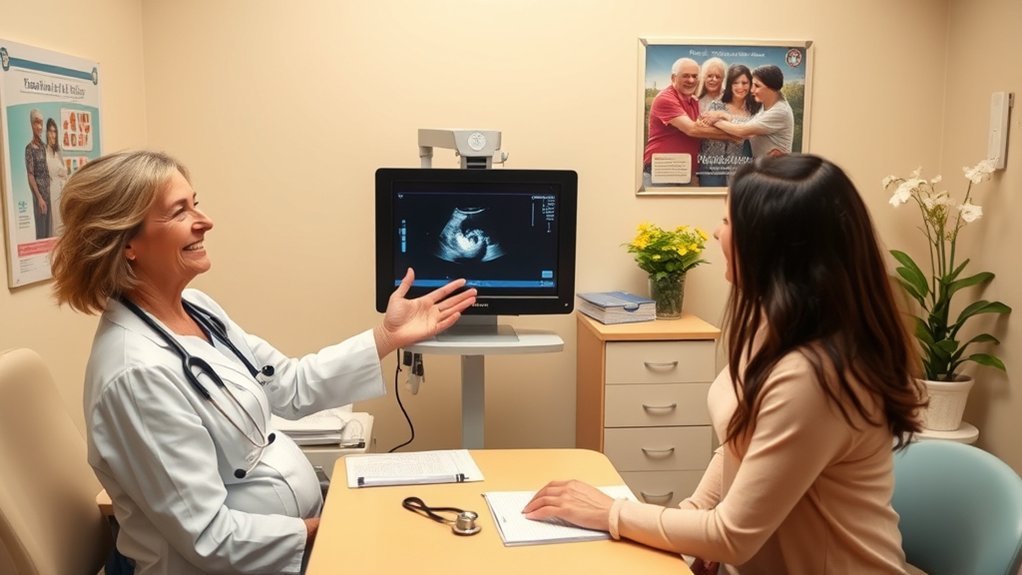Your first prenatal visit is a vital step, a moment of connection, and an opportunity for guidance. It’s where you’ll begin to understand your health, your baby’s development, and the journey ahead. During this appointment, you’ll receive insights that can shape your pregnancy and parenting experience. As you prepare for this important occasion, consider what you want to learn and how it can impact your path forward.
Importance of the First Prenatal Visit

When you discover you’re pregnant, scheduling your first prenatal visit is vital for both your health and your baby’s development. This initial appointment allows your healthcare provider to assess your overall well-being and identify any potential risks.
You’ll undergo various tests and screenings that help monitor your pregnancy’s progression. Additionally, this visit offers an opportunity to discuss your medical history, lifestyle, and any concerns you may have.
Establishing a strong relationship with your healthcare provider during this visit can foster open communication throughout your pregnancy. It’s important to address questions about nutrition, exercise, and prenatal vitamins, as these factors greatly influence your baby’s growth.
Early engagement in prenatal care promotes healthier outcomes for both you and your child.
What to Expect During the Appointment

As you prepare for your first prenatal appointment, it’s helpful to know what to expect during the visit.
You’ll likely begin by filling out forms regarding your medical history, lifestyle, and any previous pregnancies. Your healthcare provider will then conduct a thorough assessment. This may include measuring your weight, blood pressure, and possibly taking blood samples for initial tests.
You might also discuss your due date and any symptoms you’ve experienced. Don’t hesitate to ask questions or express concerns; this is a time for open communication.
Expect to receive information on nutrition, exercise, and prenatal vitamins. Most importantly, remember that this appointment is a crucial step in ensuring a healthy journey for you and your baby.
Key Health Assessments and Screenings

During your prenatal visit, your healthcare provider will conduct several key health assessments and screenings to monitor both your well-being and your baby’s development.
Expect a thorough medical history review, including any pre-existing conditions and medications. They’ll measure your weight and blood pressure, ensuring you’re on track.
Blood tests are common, checking for anemia, infections, and your blood type. A urine sample may be collected to screen for protein and sugar levels, which can indicate potential issues.
Your provider might also perform an ultrasound to assess your baby’s growth and heartbeat.
These assessments are essential in identifying any risks early on, allowing for timely interventions and support throughout your pregnancy journey.
Discussing Lifestyle Changes and Recommendations
While steering through your pregnancy, it’s crucial to discuss lifestyle changes and recommendations that can positively influence your health and that of your baby.
These adjustments can make a significant difference in your overall well-being. Consider the following key points to enhance your prenatal experience:
- Maintain a balanced diet rich in fruits, vegetables, and whole grains.
- Stay hydrated by drinking plenty of water throughout the day.
- Engage in regular, moderate exercise to support physical and mental health, unless advised otherwise by your healthcare provider.
- Limit stress through relaxation techniques like yoga or meditation.
- Avoid harmful substances, including tobacco, alcohol, and certain medications.
These lifestyle changes can foster a healthier pregnancy, leading to better outcomes for both you and your baby.
Questions to Ask Your Healthcare Provider
When you meet with your healthcare provider, it’s important to discuss your health history and any potential risks.
Don’t hesitate to ask about recommended testing and screenings that can guarantee both you and your baby stay healthy.
Your questions are essential in creating a personalized care plan that addresses your unique needs.
Health History Inquiry
Understanding your health history is essential for ensuring a safe and healthy pregnancy. Your healthcare provider will likely ask a series of questions to tailor your care appropriately.
Here are some key topics to discuss:
- Past pregnancies, including outcomes and any complications
- Existing medical conditions, such as diabetes or hypertension
- Family medical history, particularly genetic disorders
- Lifestyle factors, including diet, exercise, and substance use
- Current medications, supplements, or herbal remedies
Testing and Screenings
As you prepare for your prenatal visits, it’s important to know what testing and screenings you might need to guarantee both your health and your baby’s well-being.
During your appointment, ask your healthcare provider about routine blood tests, such as those for anemia, and screenings for infectious diseases like HIV or syphilis. You should also discuss genetic testing options, including carrier screenings and non-invasive prenatal testing (NIPT).
Don’t hesitate to inquire about ultrasounds and their purposes, such as confirming viability or evaluating fetal anatomy. Understanding the rationale behind each test can ease your concerns and help you make informed decisions.
Preparing for Future Prenatal Visits
As you prepare for future prenatal visits, it’s important to think about the essential questions you want to ask your healthcare provider.
Tracking your health progress and maintaining organized medical documents can greatly enhance your experience.
Being proactive will help guarantee that you receive the best care possible for you and your baby.
Essential Questions to Ask
What essential questions should you consider asking during your prenatal visits? Being proactive can help you feel more informed and confident about your pregnancy journey.
Here are some key questions to keep in mind:
- What prenatal vitamins do you recommend, and when should I start taking them?
- Are there any specific dietary changes I should make for a healthy pregnancy?
- What symptoms should I report, and what’s considered normal?
- How often will I need to schedule visits, and what can I expect during each one?
- What resources do you suggest for childbirth classes and parenting support?
Asking these questions lays the groundwork for a solid relationship with your healthcare provider and guarantees you’re well-prepared for your pregnancy.
Tracking Health Progress
Tracking your health progress during pregnancy is essential not just for your well-being, but also for the development of your baby. Regular check-ups allow you to monitor crucial signs, weight gain, and overall health.
Keep a record of your symptoms and any changes you experience, as these can provide your healthcare provider with valuable insights. Take note of your nutrition and physical activity levels, as they play a critical role in both your health and your baby’s growth.
Consider using apps or journals to document your journey, making it easier to share information during future prenatal visits. This proactive approach not only empowers you but also fosters a strong partnership with your healthcare team, ensuring the best possible outcomes for you and your baby.
Preparing Medical Documents
Gathering and organizing your medical documents is an important step in preparing for future prenatal visits.
Having your information readily available helps guarantee a smooth consultation with your healthcare provider.
Here are some essential items to collect:
- Medical history: Include past pregnancies, surgeries, and chronic conditions.
- Current medications: List all prescriptions, over-the-counter drugs, and supplements.
- Vaccination records: Confirm your immunizations are up-to-date, particularly for prenatal care.
- Lab results: Bring any relevant tests, such as blood work or genetic screening.
- Insurance information: Have your policy details handy for billing and coverage questions.
Frequently Asked Questions
Can I Bring My Partner or Support Person to the Appointment?
Yes, you can bring your partner or support person to the appointment. Their presence can provide emotional support and help you discuss important topics, ensuring you both feel involved and informed during this crucial time.
What Should I Wear to My First Prenatal Visit?
Wear something comfortable, like your favorite pair of soft pajamas. Opt for loose-fitting clothing, as you may need to change or undergo exams. It’s essential to feel relaxed and at ease during your visit.
How Long Will the First Prenatal Visit Typically Last?
Your first prenatal visit typically lasts about one to two hours. This time allows for a thorough discussion of your medical history, questions, and initial examinations to guarantee a healthy pregnancy journey ahead.
Are There Any Costs Associated With the First Prenatal Visit?
Yes, there are costs associated with your first prenatal visit. These may include co-pays, lab tests, and ultrasounds, depending on your insurance coverage. It’s best to check with your provider for specific details and potential expenses.
What Should I Do if I Have Concerns Before the Visit?
If you have concerns before your visit, jot them down and prioritize. You can also call your healthcare provider’s office for guidance. They’ll help address your worries and prepare you for your appointment.
Conclusion
Your first prenatal visit is a significant step toward a healthy pregnancy and future parenthood. As the saying goes, “an ounce of prevention is worth a pound of cure.” By actively engaging with your healthcare provider and addressing your concerns, you’re setting the stage for a positive journey. Remember, this partnership is essential for your well-being and that of your baby. Embrace this opportunity to learn and prepare for the months ahead, and don’t hesitate to seek guidance.
